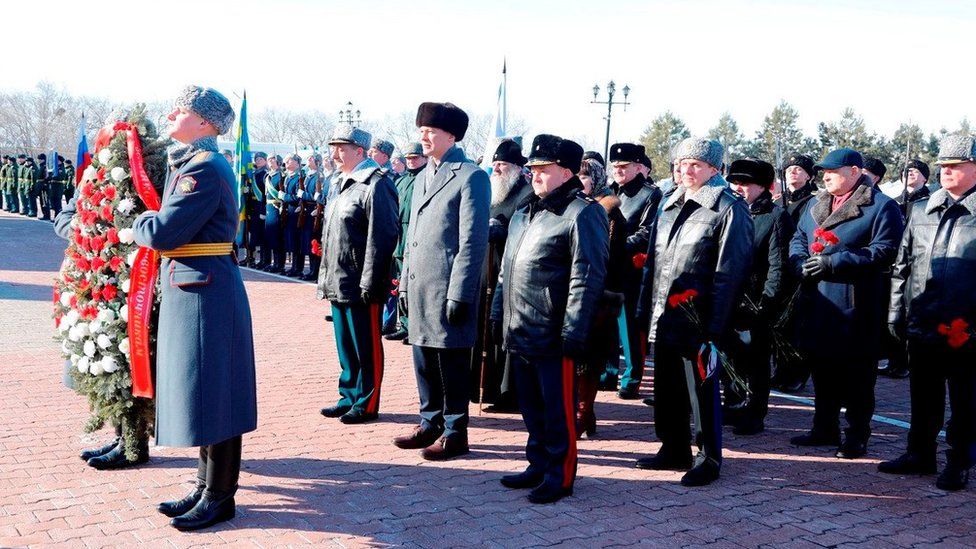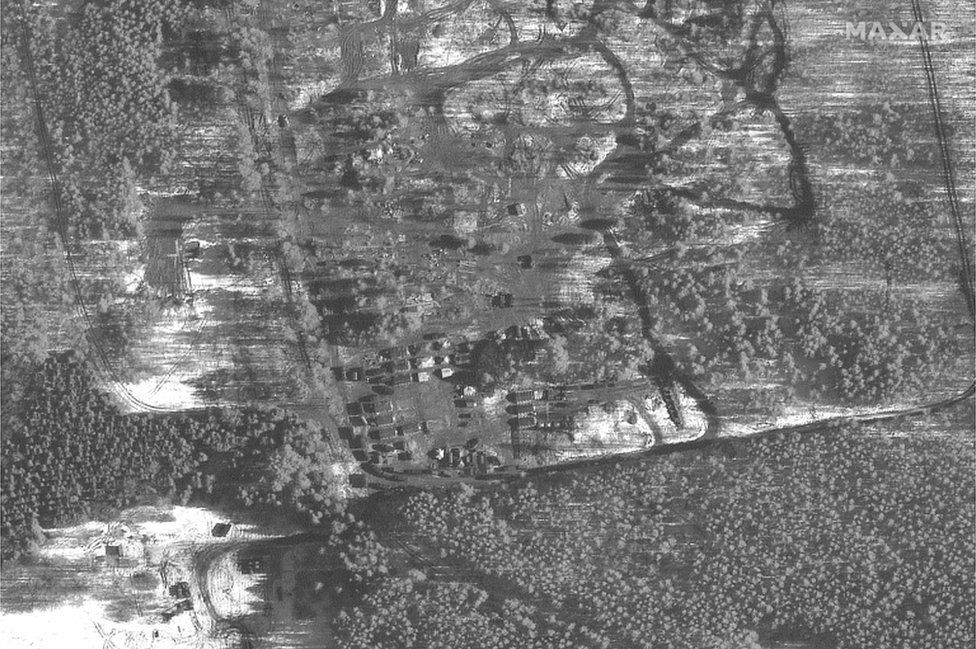Ukraine conflict: Putin tells Russians security is non-negotiable
 Image source, Russian defence ministry
Image source, Russian defence ministryPresident Vladimir Putin has insisted that Russia's interests and security are non-negotiable, amid reports of more Russian troops moving closer towards Ukraine's borders.
Mr Putin gave a video address, hours after US President Joe Biden warned of "the beginning of a Russian invasion".
Russia was always "open for direct and honest dialogue", Mr Putin said, but he had full confidence in the military.
The West has announced a range of sanctions on Russian interests.
"We've cut off Russia's government from Western financing," Mr Biden said, after Russia's upper house of parliament authorised the president to send troops into two parts of eastern Ukraine controlled by Russian-backed separatists.
- EXPLAINER: What sanctions are being imposed on Russia?
- THE BASICS: What does Putin want?
- FACT-CHECKED: Vladimir Putin's Ukraine speech
Mr Putin declared on Monday night that Russia had recognised the independence of the so-called people's republics of Luhansk and Donetsk, tearing up a peace accord with Ukraine.
Ukraine's foreign ministry urged all its citizens to leave Russia, warning that the "escalating Russia aggression against Ukraine" could limit consular assistance. The military in Kyiv also announced it was immediately calling up all reservists aged 18 to 60, both officers and privates for a maximum of a year.
Meanwhile, in the rebel-held areas, separatist leader Denis Pushilin said military mobilisation was gathering pace to counter what he described as Ukrainian aggression, adding that he could also ask Russia for help. Appearing alongside him, a senior official from Russia's ruling United Russia party said 93,000 people had been evacuated to Russia.
Moscow has also begun evacuating its embassy in Kyiv and has lowered its flag there, reports say.
President Putin's claim that the military would go to "maintain peace" was derided as nonsense by the West. Rejecting his spurious claim of genocide in eastern Ukraine, UN Secretary-General António Guterres said he was concerned about "the perversion of the concept of peacekeeping".
Mr Biden said "to put it simply, Russia just announced that it is carving out a big chunk of Ukraine".
Despite Mr Putin's insistence that he was still open to diplomacy, France's foreign minister and US Secretary of State Anthony Blinken both cancelled planned meetings with Russia's foreign minister, Sergei Lavrov.
French Foreign Minister Yves Le Drian later said Mr Putin's aim was to "negate" Ukraine as a sovereign country. German Foreign Minister Annalena Baerbock said Mr Putin was trying to turn back the wheel of history. But both said they were open to further negotiations with Moscow.
It is not yet clear if any Russian troops have yet crossed the border into Ukraine. However, US satellite imagery has highlighted several new troop and equipment deployments in western Russia, and more than 100 vehicles at an airfield in Belarus near Ukraine's border.
 Image source, SATELLITE IMAGE 2022 MAXAR TECHNOLOGIES / EPA
Image source, SATELLITE IMAGE 2022 MAXAR TECHNOLOGIES / EPA
Mr Biden said he was announcing an initial tranche of measures, targeting high-ranking Russia's "elites" and its foreign debt, to prevent it raising state financing from Western financial institutions.
The European Union and UK also announced a wave of sanctions against Russian banks and individuals on Tuesday:
- Germany also halted a major joint infrastructure project with Russia, the Nord Stream 2 gas pipeline, despite Europe's reliance on Russian gas supplies and the fact that the €10bn (£8.3bn) project is ready to open supply lines
- All 27 EU member states agreed a range of anti-Russia measures, targeting all 351 members of Russia's lower house who voted to recognise the two breakaway regions of Ukraine as independent states. The EU's response also targets 27 individuals and entities involved in the decision. Sources say Defence Minister Sergei Shoigu and Foreign Minister spokeswoman Maria Zakharova face a travel ban and asset freeze.
- UK Prime Minister Boris Johnson announced that five banks have had their assets frozen in Britain, along with three Russian billionaires who will be hit with UK travel bans. Canada, Japan and Australia later confirmed similar measures
- Ukraine's parliament voted on Wednesday to impose sanctions on 351 Russian individuals.
European Commission Vice President Vera Jourova said it was a mistake to exclude the Russian leader. "Vladimir Putin should be first on the list," she told Czech daily Hospodarske Noviny.
British Foreign Secretary Liz Truss said the UK would use "every lever at our disposal" to stop Russia's threats against Ukraine. Responding to criticism from some MPs that the UK government had not gone far enough Ms Truss wrote in The Times that G7 allies had agreed on further sanctions and "nothing is off the table".



No comments